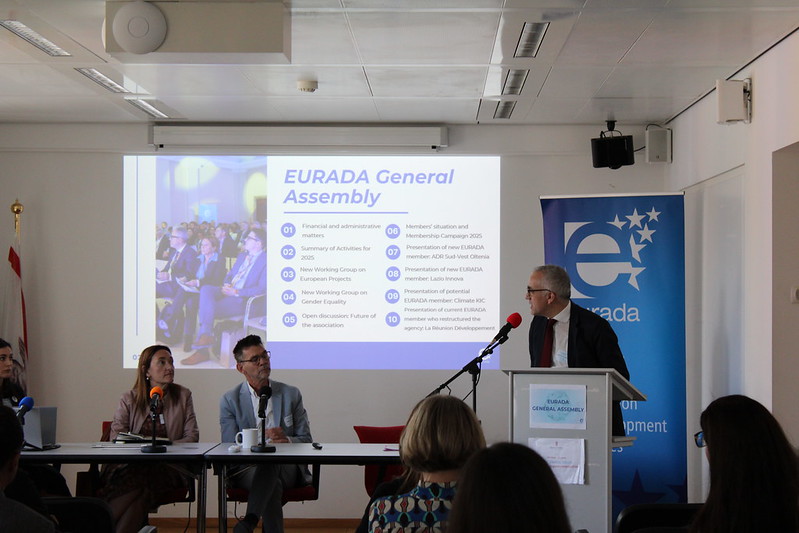On 20 May, EURADA held its General Assembly at the Representation Office of the Umbria Region in Brussels. We extend our sincere thanks to our esteemed member, SVILUPPUMBRIA, for their warm hospitality and for welcoming us to their premises. It was a highly productive morning, reflecting the collective dynamism of our community of regional development agencies.
Click here to view the album of photographs taken during the event.
The General Assembly began with welcoming remarks by Theo Follings, President of EURADA, who formally opened the meeting and set the stage for the discussions to follow.
Next, Elena Bortoluzzi, Financial Manager, provided an update on financial and administrative matters. The balance sheet and income statement have been sent to the auditor, who is currently reviewing them. The financial results for 2024 are expected to be finalised in the coming weeks. Once all documents are ready for approval, a Board of Directors meeting, most likely to be held online, will be scheduled.
Francesco Molica, EURADA’s Director, presented the main ongoing and planned activities for 2025, highlighting strategic initiatives and priorities.
The meeting continued with the launch of two new thematic EURADA Working Groups:
- The Working Group on Consortia for Projects, introduced by Nora Scantamburlo, EU Projects Manager, and Cristina Gallardo Rey from FUNDECYT.
- The Working Group on Gender Equality, presented by Cristina Sanz Rutherford, Project and Policy Officer, together with Cristina Oyon, Vice-President of EURADA.
Members present at the meeting expressed strong interest in the two new initiatives proposed by the EURADA Secretariat and gave their approval to move forward with both. In particular, several members were intrigued by the newly introduced Working Group on Consortia for Projects. This Working Group aims to enhance collaboration among member Development Agencies and their respective networks by facilitating structured discussions, matchmaking activities, and the joint development of project proposals. The initiative is designed to support members in identifying relevant EU funding opportunities aligned with their strategic interests. It will also foster the formation of partnerships - either among EURADA members or with other key stakeholders and actors within their ecosystems.
By promoting cooperation and strategic alignment, the initiative aims to increase the success rate of project submissions and strengthen the overall impact of EURADA's member activities.
The idea of a Working Group on Gender was first proposed one year ago during AGORADA 2024. This joint initiative, led by ART-ER, SPRI, and EURADA, aims to strengthen gender mainstreaming and promote Gender Equality (GE) across regional development policies, ecosystems, and Regional Development Agencies (RDAs), applying an intersectional perspective throughout.
The initiative is strategically relevant for several reasons. Gender Equality is increasingly recognised as a precondition for regional competitiveness, innovation, and social cohesion. There is clear evidence that promoting GE leads to stronger economies and more inclusive territorial outcomes. Furthermore, the initiative aligns with EU cohesion policy priorities, as addressing gender-based inequalities is essential for reducing regional disparities and fostering long-term development. In addition, the growing requirement for Gender Equality Plans (GEPs) in EU-funded projects makes this work even more timely and necessary.
SPRI and ART-ER are the founding members of this initiative. Other agencies that have already expressed interest in joining the Working Group include OOST NL, FUNDECYT-PCTEX, ZARA, ADR Nord-Vest, ACCIÓ, Canary Islands Institute of Technology (ITC) and Trentino Sviluppo. The invitation to participate remains open to all EURADA members who wish to contribute to this important initiative.
The next item on the EURADA General Assembly's agenda was an open discussion on the future of the association. Francesco Molica encouraged participants to share ideas and perspectives on EURADA’s long-term direction. Among the topics discussed was the potential expansion of the association’s membership base. While EURADA currently focuses on recruiting Regional Development Agencies (our regular members), some members suggested broadening the scope to include other entities - such as consultancies, science parks, and similar organisations that share the mission of RDAs. These would fall under the category of "associated members." Several participants expressed their willingness to support this effort by putting the EURADA Secretariat in contact with other RDAs or potential associated members who could contribute to the association’s mission.
Members also endorsed a new, more pragmatic approach by the EURADA Secretariat, encouraging the Director and staff to produce and publish more position papers. This effort aims to ensure that the voice of RDAs is clearly heard by European institutions, especially at this critical time for regional development policy.
Giacomo Frisanco, Members’ Manager, provided the audience with an overview of the current membership status and presented the strategy for the 2025 membership campaign. The EURADA Secretariat is investing significant efforts in maintaining and strengthening the association’s core business activities in support of its members.
Giacomo also welcomed two new EURADA members who joined the network in the first months of this year: ADR Sud-Vest Oltenia (Romania) and Lazio Innova (Italy). Both agencies were given 15-minute slots to present their organisation, main activities, and strategic focus to the rest of the EURADA membership.
An additional presentation was offered to a potential new member, Climate KIC (Belgium), which is currently considering joining EURADA over the summer. The audience also had the opportunity to hear a different kind of presentation: one from a long-standing member, La Réunion Développement (France), which recently restructured its mission and governance.
Thank you to the 26 EURADA members who joined us in Brussels for this important gathering. Your continued commitment is shaping the future of regional development in Europe!
